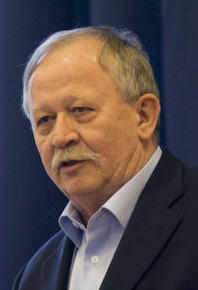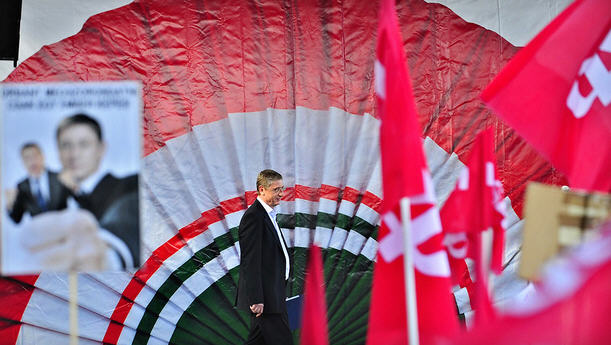At this moment another demonstration is taking place in Budapest. Again thousands are out on the streets. This time they’re demonstrating against the Orbán government’s effort to steal the private pension savings of those 60,000 people who four years ago when the government decided to “nationalize” the accumulated savings of 3 million people opted to leave their savings in private funds despite all sorts of threats. As it turned out, their decision was wise. These funds did well over the years and by now the average investor has 3.5 million forints in his account. According to estimates, if the government manages to get hold of the savings in these pension funds, it will reap another 200 billion forints. Admittedly, this is a great deal less than the 3 trillion that was brazenly expropriated in 2010, but it looks as if the Hungarian budget is in desperate need of new sources of revenue.
Although it is too early to write anything meaningful about this latest demonstration, it offers an opportunity to say something about the recent demonstrations in general and to acquaint readers with two of their organizers. First, rumor has it that, appearances notwithstanding, the Fidesz leadership is worried about the long-term effects of the demonstrations on Fidesz’s support and image. Apparently, next week the party’s top brass will get together to discuss the situation.
Early on, Fidesz politicians thought that if they retreated on the question of an internet tax the demonstrations would disappear. They were also happy to hear that the organizers of some of the demonstrations don’t want anything to do with politics. Yet there are signs of grave trouble because dissatisfaction with the government is widespread. “Today we don’t really know whom we should appease.”
Here I would like to introduce the organizers of the Facebook group “We will not be silent!” To focus on this group is especially timely because I just learned that one of the speakers of the November 17 gathering in front of the parliament building, Balázs Nemes, who was asked to speak at today’s demonstration, refused to participate because not only a civic group but a political party, Együtt, is involved. And this group doesn’t want to cooperate with any existing parties. In their eyes, the parties are all the same. This group was the one that immediately rejected “the advances of Ferenc Gyurcsány and DK.”
Some of the more seasoned politicians of the democratic parties, for example, Gábor Kuncze, reacted to Balázs Nemes’s November 17 speech rather heatedly on television. He objected to the speaker’s condemnation of the entire period between 1989 and 2014. ATV decided to have Kuncze meet Balázs Nemes and Petra Sára Kiss, another organizer of the group. On Sunday the three appeared on Antónia Mészáros’s “Szabad szemmel” program. It was a very informative twenty minutes. My conclusion was that it is unlikely that these particular young people will be the catalysts of regime change in Hungary.
My problem with them was not that they are inexperienced and somewhat ignorant of the political events of the last twenty-five years, but that they didn’t grasp Kuncze’s simple, logical explanation of why their ideas were fallacious. Although the conversation was about 20 minutes long, here I will concentrate on two points that Kuncze made. The first was his description of the difference between the first twenty and the last five years. The second was his emphasis on the necessity of parties and politicians.
The position of Nemes and Kiss was that the earlier governments did something so terribly wrong that it inevitably led to Fidesz’s illiberal governance. Kuncze’s position, on the other hand, was–which he tried to explain at least two different ways to no avail–that yes, past governments didn’t do a good job and the electorate punished them for their bad governance. They lost the election. The problem is not the two-thirds majority but what Fidesz did with it in parliament. In 1994 the MSZP-SZDSZ coalition had more than a two-thirds majority, but the Horn-Kuncze government did not change the constitution or the electoral law, did not appoint party hacks to the constitutional court, and did not build an illiberal state. When the people of Hungary voted for Fidesz, they did not anticipate what was coming. After all, Fidesz did not have a party program. In fact, Viktor Orbán said not a word about his plans. So, the present government’s governing style is not the necessary and inevitable result of the bad governance of earlier governments.
I kept watching the faces of these two young people, and it seemed that they didn’t understand what Kuncze was getting at. Nemes muttered something about a “qualitative” difference between the earlier governments and the one today, but he didn’t grasp the essential difference between them. As for Petra Kiss, she, in my opinion, is even more hostile to everything that happened before 2010. She is also more naive about what one can achieve without parties and politicians. As Kuncze pointed out, if they want to remain involved then sooner or later either they will have to make peace with the present democratic opposition or they themselves will have to create parties. Kiss dreamily announced that for the time being they don’t want to do anything concrete. They just want young people to remain engaged. This is a fine idea, but surely it is not enough if these people are serious about sending the Orbán government packing. She also stressed that “there should be many, many parties,” as if she were totally ignorant of the current electoral law that precludes the existence of many small parties against the Fidesz monolith. All in all, I doubt that these two new stars of the November 17th demonstration will be ready by either 2016 or 2018 for serious roles in a new political constellation.
As for cooperation among the various groups, the prospects are not auspicious. The organizers of the demonstration against the internet tax refused to cooperate with the “We will not be silent!” group. Balázs Nemes was invited by the organizers of today’s demonstration but refused to participate. Meanwhile, their Facebook page is full of criticism of their position. Most of the comments talk about the necessity of cooperation between civic movements and parties. Some accuse the organizers of “not hearing the voice of the masses.” Or, “in my opinion this party neutrality is going in the wrong direction.” Critical comments don’t seem to make a dent on this group’s leaders.
I still think that these demonstrations are important and I’m also sure that some of these Young Turks will have political roles in the future, but I don’t think that Balázs Nemes and Petra Sára Kiss will be among them.







